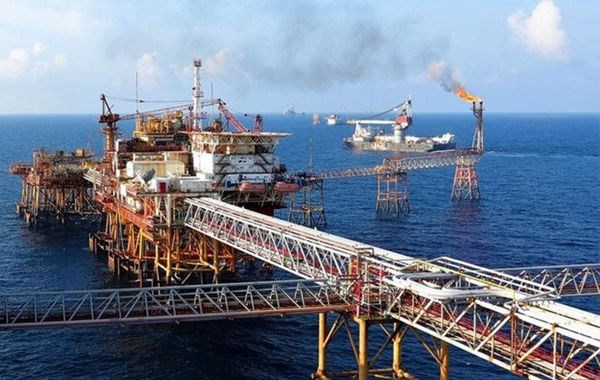Workshop discusses draft amendments to Petroleum Law
Experts and policymakers have gathered in a workshop discussing the draft of the amended Petroleum Law in an effort to enhance regulatory framework in the oil and gas sector.
 Illustrative image (Source: VNA)
Illustrative image (Source: VNA)The event was co-hosted by the Institute for Brand and Competitiveness Strategy (BCSI) and the Vietnam Clean Energy Association (VCEA) in Hanoi on July 26.
The Law on Petroleum was first introduced on July 6, 1993
and revised in 2000, 2008 and 2018. Together with guiding documents, it has
been facilitating the development of the oil and gas industry. However, there
have been a number of challenges emerging in the enforcement of the law.
For examples, there are major gaps between several provisions and the changing
reality as well as the robust growth of the energy sector at present. Some
parts of the law are also not consistent with related laws and regulations.
A draft revised law on oil and gas was first submitted for discussion at the third session of the 15th National Assembly, aiming to build a law more relevant to the current situation and enhance the effectiveness and efficiency of State governance in the field. The revision also seeks to provide a more synchronized regulatory framework and remove legal barriers for investors.
Commenting on the draft of the bill, Director of the Vietnam Environment Incident Response Centre Pham Van Son said the bill must strengthen accountability of organisations and individuals involved in oil and gas production as well as of regulators, given that Vietnamese leaders have committed to no trade-off between environment and economic interests.
Organisations and individuals involved in oil and gas production must develop a plan for prevention of and emergency response to environmental incidents which shall be submitted to concerned authorities, he suggested, adding that they must be obliged to implement the plan once it is approved.
He further noted that regulators must verify the plan and have it exercised in reality before approval. After the approval, they also need to check whether the plan is properly executed on an annual basis, he said.
Son proposed that the law should include a separate stipulation on environmental assessment.
Echoing Son’s view, Assoc. Prof., Dr. Nguyen Canh Nam from the Vietnam Mining Science and Technology Association (VMSTA) said the bill should include specific provisions focusing on environmental incidents. It is critical to ensure that these provisions will be properly enforced under supervision.
Several participants held that it is important for the law to strengthen mechanism for attracting investment in the oil and gas industry.
More policies are needed to better lure investment in oil and gas exploration and production, said economist Nguyen Minh Phong. The law must clarify concepts of preferential policies in import and export of oil and gas and include additional provisions that allow the withdrawal of incentives in case investors fail to comply with certain regulations or commit wrongdoings, according to Phong.
Corporate income tax should be slashed from 25% to 20% while export duties should be doubled, Phong recommended. Greater attention should also be paid to national energy security, he added.
Agreeing with Phong, BCSI Director Dr. Vo Tri Thanh emphasised that the withdrawal of incentives should be done in accordance to market principles. There should be warnings for investors if they fail to fulfill their obligations in terms of environmental protection, technology and investment.
Dr. Doan Van Thuan from the Vietnam Petroleum Institute underscored Vietnam’s commitment to achieving net zero emission by 2050 at the 26th UN Climate Change Conference (COP26) in Glasgow, the UK last year, saying there should be policies to encourage the reduction of carbon dioxide emissions.
The amended Petroleum Law is scheduled to be tabled for discussion again and adopted at the upcoming fourth session of the 15th National Assembly./.
A draft revised law on oil and gas was first submitted for discussion at the third session of the 15th National Assembly, aiming to build a law more relevant to the current situation and enhance the effectiveness and efficiency of State governance in the field. The revision also seeks to provide a more synchronized regulatory framework and remove legal barriers for investors.
Commenting on the draft of the bill, Director of the Vietnam Environment Incident Response Centre Pham Van Son said the bill must strengthen accountability of organisations and individuals involved in oil and gas production as well as of regulators, given that Vietnamese leaders have committed to no trade-off between environment and economic interests.
Organisations and individuals involved in oil and gas production must develop a plan for prevention of and emergency response to environmental incidents which shall be submitted to concerned authorities, he suggested, adding that they must be obliged to implement the plan once it is approved.
He further noted that regulators must verify the plan and have it exercised in reality before approval. After the approval, they also need to check whether the plan is properly executed on an annual basis, he said.
Son proposed that the law should include a separate stipulation on environmental assessment.
Echoing Son’s view, Assoc. Prof., Dr. Nguyen Canh Nam from the Vietnam Mining Science and Technology Association (VMSTA) said the bill should include specific provisions focusing on environmental incidents. It is critical to ensure that these provisions will be properly enforced under supervision.
Several participants held that it is important for the law to strengthen mechanism for attracting investment in the oil and gas industry.
More policies are needed to better lure investment in oil and gas exploration and production, said economist Nguyen Minh Phong. The law must clarify concepts of preferential policies in import and export of oil and gas and include additional provisions that allow the withdrawal of incentives in case investors fail to comply with certain regulations or commit wrongdoings, according to Phong.
Corporate income tax should be slashed from 25% to 20% while export duties should be doubled, Phong recommended. Greater attention should also be paid to national energy security, he added.
Agreeing with Phong, BCSI Director Dr. Vo Tri Thanh emphasised that the withdrawal of incentives should be done in accordance to market principles. There should be warnings for investors if they fail to fulfill their obligations in terms of environmental protection, technology and investment.
Dr. Doan Van Thuan from the Vietnam Petroleum Institute underscored Vietnam’s commitment to achieving net zero emission by 2050 at the 26th UN Climate Change Conference (COP26) in Glasgow, the UK last year, saying there should be policies to encourage the reduction of carbon dioxide emissions.
The amended Petroleum Law is scheduled to be tabled for discussion again and adopted at the upcoming fourth session of the 15th National Assembly./.













